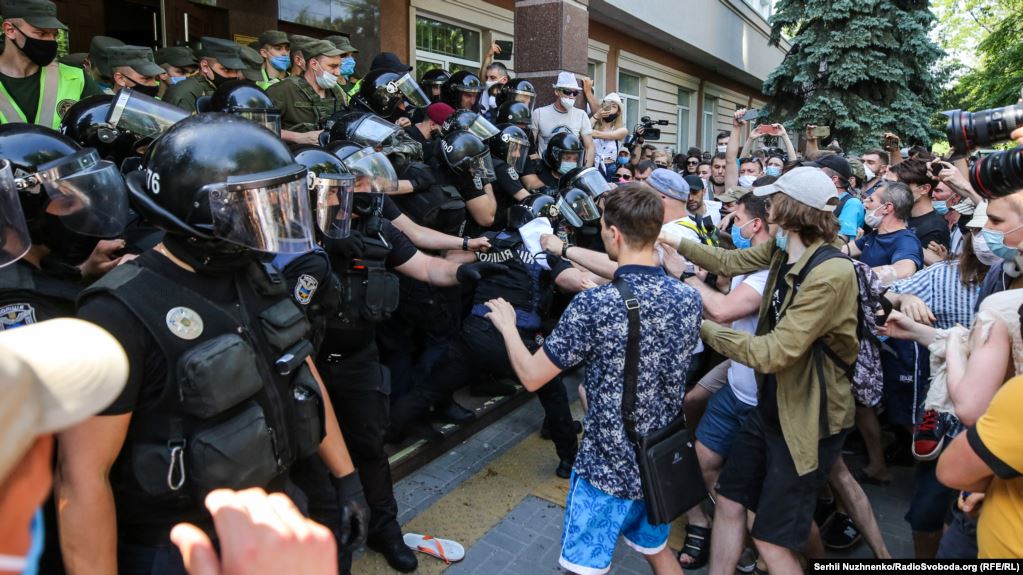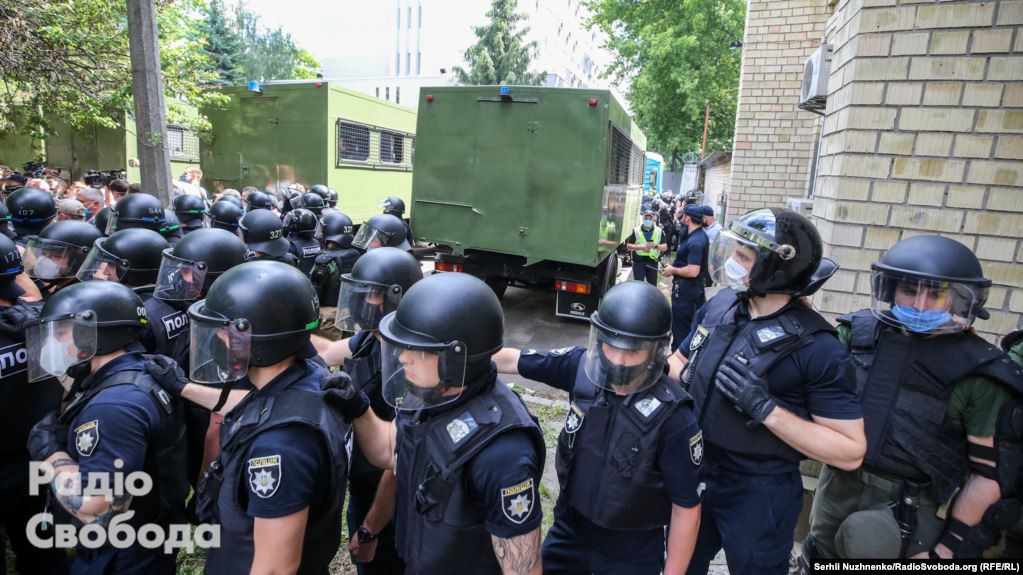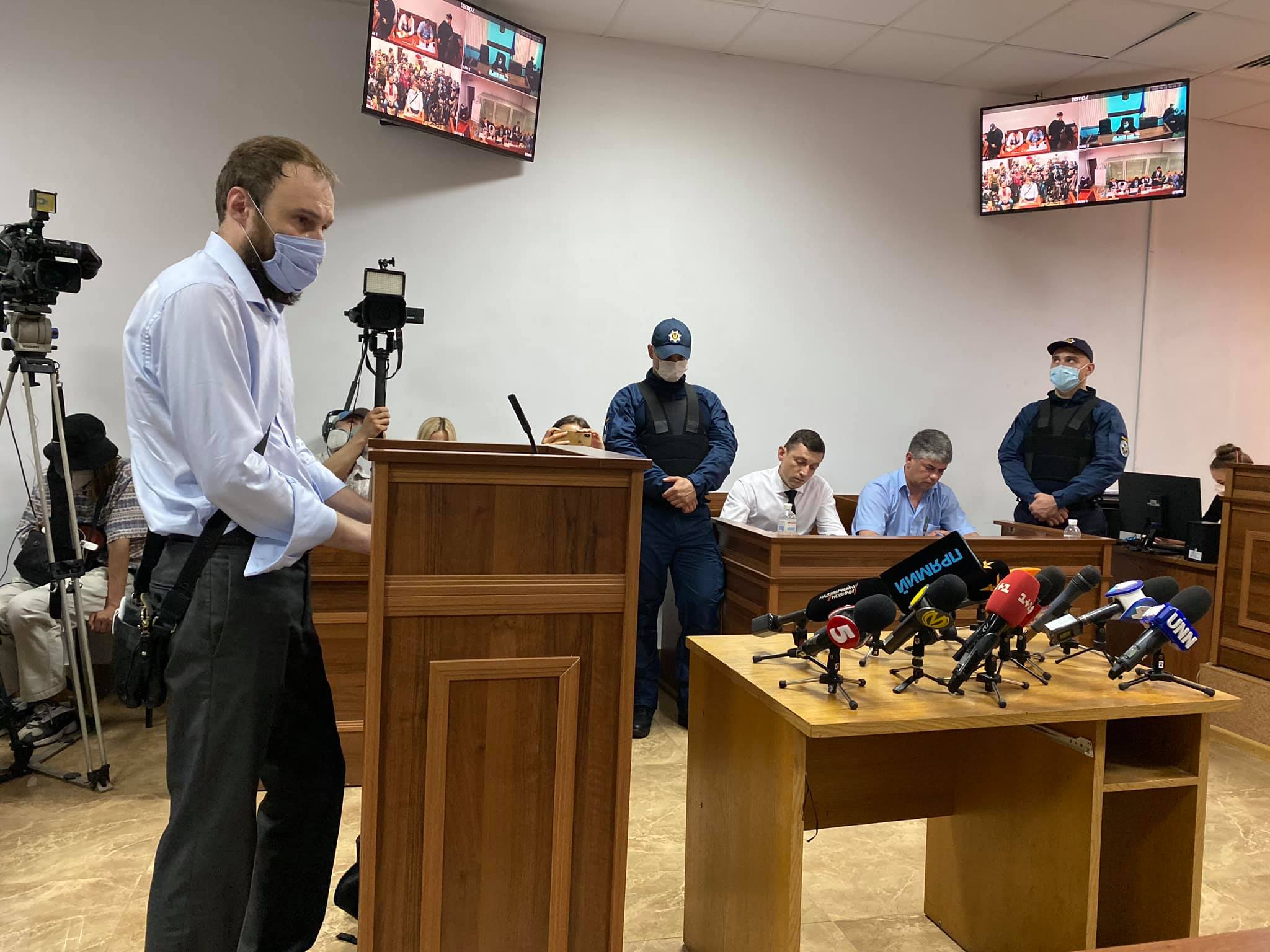Sternenko tore up the decision for a measure of detention as soon as he stepped outside the court building. He believes that the outcome of the trial -- 60 days round-the-clock house arrest in his place of registration in Odesa, from which he escaped for fear of his life -- was predetermined to give law enforcers a pretext for putting him in jail “for violating house arrest.”

The protesters then moved to the house of the Prosecutor General, who turned out to be absent, and then to the house of President Volodymyr Zelenskyy.
Later, Sternenko informed that the head of Kyiv Shevchenkivskyi district court which considered the case promised to reconsider the court decision because today's motion is impossible to implement.
"He personally came to the court and promised it under video record. This is our common victory! Tomorrow I will let you know exactly when the meeting will be scheduled," wrote the activist.
Serhiy Sternenko has become a symbol of the confrontation between Ukraine’s law enforcement system and ordinary citizens:
This young man 25 years of age, hailing from the southeastern city of Odesa, has already earned himself a name by uncovering the corruption of Odesa’s notoriously lawless mayor Hennadiy Trukhanov and countering a pro-Russian takeover of the city and southeastern Ukraine in general - the ultimate target for Russia in the 2014 unrest following the Euromaidan revolution.
Sternenko believes that it was for his anti-corruption activities that he became the target for three armed attacks in 2018. During the last one, he killed one of the attackers while defending himself. The case gained political colors when Zelenskyy appointed a new Prosecutor General, Iryna Venediktova, who stated immediately that Sternenko has to be charged with deliberate murder, all while the investigation into the attacks on the activist were gathering dust.
Euromaidan Press wrote about the case here and here.
This raised suspicions of Ukraine’s top authorities being in cahoots with the mayor whose criminal grip over Odesa is akin to a “separatist republic,” according to another local activist who stood up against Trukhanov and, like Sternenko, was stabbed on the street.
, an activist from another city of Ukraine’s south-east, Kherson. She was doused with sulphuric acid and died after three months of suffering in the hospital.
- Read more: Attacks on civic activists in Ukraine reaching critical level, encouraged by unreformed police
On 15 June, hundreds of people showed up at the courthouse where Sternenko was being assigned a preventive measure, to support him as well as their own right for self-defense. The hearing lasted for two days and was accompanied by street protests and clashes with police.
As it often happens in Ukraine, the court dismissed all the arguments of Sternenko's defence and fulfilled the prosecutor's motion to apply round-the-clock house arrest to Sternenko.
Four days earlier, after more than a month of attempts, the law enforcement forces finally managed to serve Sternenko with a notice of suspicion. Thus, the activist is recognized as a victim and as a suspect simultaneously in the same incident when he was attacked. The court hearing on applying a measure of restraint to Sternenko started the next day.
The case is an eloquent example of the different instruments which the Ukrainian justice system uses to jail those who the authorities want behind bars.
The court. Day one
1. Notorious judge and prosecutor. The automatic distribution system defined that judge Volodymyr Buhil will consider the case on applying a measure of restraint. Sternenko and his defenders filed a motion to recuse the judge, but it was rejected.
Mykhaylo Zhernakov, Head of the DEJURE Foundation, a leading NGO advocating for judiciary reform in Ukraine, gave a brief background of the judge. Buhil is one of those judges who, in connivance with the regime of disgraced ex-President Viktor Yanukovych, made illegal decisions to prosecute peaceful anti-government protesters during the Euromaidan Revolution. Zhernakov believes Buhil had to be lustrated in the judicial reform Ukraine launched after Euromaidan. Moreover, it is known that the judge concealed his wealth in his declaration of assets, falsely claimed he was attacked, and acquitted a defendant in a $500,000 bribe case while having a conflict of interest.
However, it is not the first time when such a notorious judge considers a high-profile controversial case in Ukraine.
Sternenko's defence also filed a motion to recuse the prosecutor Mykola Bozovuliak as he disclosed information about taking security measures against Sternenko, committing a criminal offense foreseen by the Criminal Code. The court predictably rejected the motion.
2. Unjustified restrictions. The atmosphere on the first day of the hearing was tense from the start.
“An hour before the court hearing along all the possible curbs, sidewalks, and walls the National Guard and the police were lined up (I wonder where they came from and whether we don’t have other crimes?),” Marian Kushnir, a RFE/RL journalist who covered the event, described.
From the very start, police prevented Sternenko’s supporters from entering the courtroom. The journalist stressed that this was not because of COVID-19 quarantine measures as the police never used this word; on the contrary, the police demanded Kushnir leave his antiseptic at the entrance.
Only some 20 people were allowed to enter, the others were crowded in a stuffy corridor, and a huge crowd gathered near the building of the court.
Dozens of people came to take Sternenko on bail. Among them, there are activists and MPs from Voice, European Solidarity, and the Servant of the People parties.
On 15 June Yaroslav Yurchyshyn, the Voice MP stated that almost 200 people were ready to bail out Sternenko.
3. Police intimidation of Sternenko supporters. By the end of 12 June, the pledgers were not allowed to enter the court. The activist refused to come without them. The situation escalated into clashes between the police and Sternenko’s supporters who wanted to enter.

Eventually, the pledgers were allowed to come in.
The court. Day two
4. A sea of law enforcement. On Monday 15 June, there were even more police and the National Guard near the court building. Protesters entering the area near the court were searched.

Later during the day, clashes between Sternenko's supporters and the law enforcers started again. Police detained five protesters.
One of the incidents happened when activist Mykola Vyhovskyi scuffled with a journalist of the notorious ZIK channel, which belongs to Viktor Medvedchuk, a top-tier ally of Vladimir Putin in Ukraine, and is almost as pro-Russian as he is. ZIK was one of the channels participating in dirty campaigns against Sternenko, portraying the anti-corruption fighter defending his life as a cold-blooded murderer.
https://www.facebook.com/220542374796239/posts/1404151479768650/
https://twitter.com/vital_ovchar/status/1272510467139948544?s=20
Police officers also tried to detain Sternenko's girlfriend.
https://www.facebook.com/sternenko/posts/2738497099759955
The law enforcers went so far as to beat a Member of Parliament - namely, Roman Lozynskyy from the Voice party.
Later, Kyiv police informed that an official investigation into the use of force by police during the detention
of protesters in support of Sternenko was launched. The detained activists were released.
5. Prosecutorial version that defies medical common sense. Meanwhile, the hearing was ongoing. On it, physicians Oleksandr Linchevskyi and Oleksandr Danyluik, who came as witnesses from the defense’s side, refuted the main version of the prosecutor’s side.
The Security Service claimed that the two attackers indeed intended to intimidate and beat Sternenko. Defending himself Sternenko covered himself with his left hand and with his right hand was lashed at both attackers with a knife, injuring them both.
The Security Service says that these actions indeed correspond to the definition of self-defense, but claims that that when one of the attackers fled, the attack was completed and nothing threatened Sternenko’s life and health anymore, but Sternenko caught up with the attacker and stabbed him in his heart, which led to his death.
Based on the injuries of the killed attacker, Dr. Danyliuk refuted the Security Service’s version. He confirmed that “it’s highly likely” that a person with a 1 cm-long linear injury of the left ventricle of the heart is able to remain active and run 99 meters, like the attacker did. The doctor added that in his practice he faced examples of such patients remaining conscious and physically active.
"My experience is more than 200 patients during 15 years."
Sternenko's lawyers asked whether the activist could have come to his senses 20 seconds after the attack, considering the splurge of adrenalin he experienced during it, and generate an intention to commit illegal acts like the prosecution claimed.
"No, it's a too short period," the doctor said.
6. Senior prosecutor who refused to authorize a notice of suspicion. Previously, journalists at slidstvo.info revealed that in the beginning of May, the senior prosecutor in the case Andriy Radionov refused to authorize a notice of suspicion to Sternenko. He withdrew from the case, stating that the investigation is biased and the notice of suspicion is illegal and contradicts the evidence collected by the investigation.

On 15 June, Radionov came to the court hearing and confirmed that the suspicion was unproven and biased. He also said that the management at the Prosecutor General’s office attempted to get this contradictory suspicion illegally authorized in violation of procedures by skirting his, Radionov’s, senior oversight and sending it to a younger prosecutor.
This younger prosecutor, Bozovuliak, now leads the case, despite the attempts of Sternenko’s defense to replace him.
Radionov confirmed that he complained to the Prosecutor's Council about pressure from Prosecutor General Iryna Venediktova.
Those present at the court hearing met Radionov's speech with a round of applause: he was the single prosecutor to go against the system.
Victoria Syumar, an MP from European Solidarity and a member of the Temporary Parliamentary Commission on attacks on the activists stated that the case is politically ordered, as did the Helsinki Human Rights Union.

